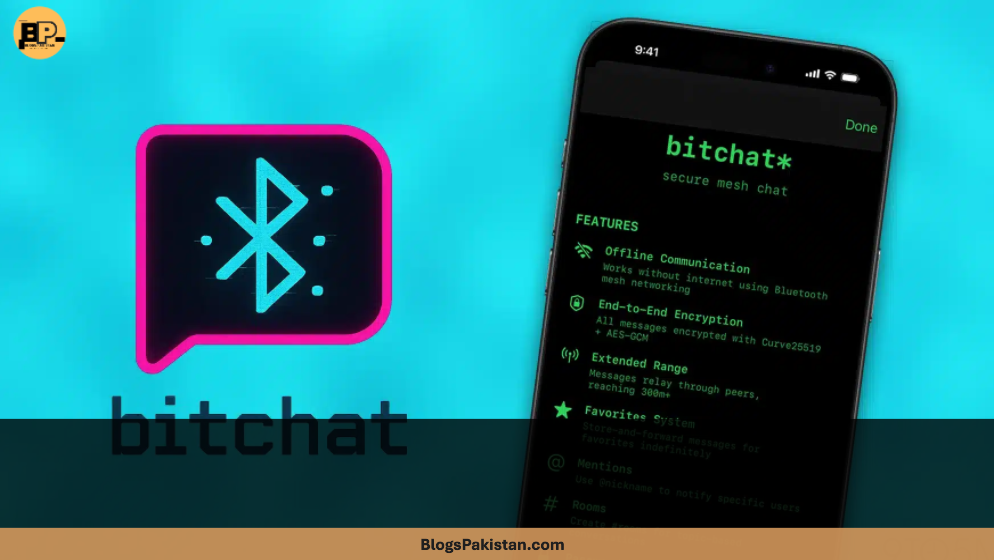Bluetooth world: Imagine you’re at a chai dhaba in Lahore, or stuck on a train ride from Delhi to Mumbai, and you want to send a private message to your friend nearby—but there’s no Wi-Fi, your mobile data is gone, and the internet is nowhere in sight. What do you do?
Well, Jack Dorsey—the brain behind Twitter—has a wild answer: use Bitchat Bluetooth , a new messaging app that doesn’t care about the internet, SIM cards, or even your phone number.
Let’s dig into what makes Bitchat not just another chat app, but a fun, rebellious, and serious contender in the world of privacy-first communication.
What Is Bitchat?
Bitchat is Jack Dorsey’s latest experiment, and it’s shaking up how we think about messaging apps. Unlike WhatsApp, Signal, or Telegram, Bitchat works without the internet. Yes, you read that right. No data? No problem.
Currently in beta for iPhone users via Apple’s TestFlight, Bitchat uses Bluetooth to build a local, peer-to-peer network. Think of it as digital gup-shup (conversation) that hops from phone to phone, like a secret note passed around a classroom—but with much tighter security.
The Magic Sauce: Bluetooth Mesh Networking
So, how does Bitchat work? Let’s break it down:
Hopping Messages Across Devices
Instead of sending your messages through cloud servers (which can be hacked, blocked, or snooped on), Bitchat sends them directly from one phone to another using Bluetooth. Each phone acts as both a sender and a relay, passing the message along. It’s like a human chain, but with phones.
Going the Distance
Bluetooth alone has a short range. But Bitchat creates a mesh network—the more people nearby using it, the further your message can travel. If you want to send a message from one end of Lahore’s Liberty Market to the other, you just need enough people in between. You can even set up “bridge devices” (like leaving your old phone at home as a relay station) to cover more ground.
Features That Make Bitchat Stand Out
1. No Internet Needed only Bluetooth
Perfect for areas where mobile data is expensive or unreliable (hello, rural Punjab and UP), or during network shutdowns.
2. No Phone Numbers or Central Servers
Bitchat doesn’t care who you are—just that you’ve got the app. No sign-ups, no phone numbers, no Big Brother watching.
3. Disappearing Messages
Messages aren’t stored forever. They’re temporary, encrypted, and never leave traces on central servers. It’s like Snapchat but for serious, private communication.
4. Password-Protected Group Chats
Create private “rooms” for your friends or colleagues using passwords and hashtags. No random strangers barging in.
5. Store-and-Forward Tech
If your friend is offline, your message will quietly wait till their phone comes back into the mesh network. No lost messages, no drama.
Privacy, Censorship, and the South Asian Context
Let’s face it: in Pakistan and India, internet shutdowns are not just rare events—they’re practically part of the news cycle. Whether it’s protests, exams, or cricket celebrations gone wild, the internet can vanish faster than your favourite biryani at Eid.
Bitchat’s decentralized, peer-to-peer design makes it censorship-resistant. There’s no central authority that can block or monitor your conversations. This is especially appealing for activists, journalists, and anyone who just wants to gossip about the latest drama without prying eyes.
A Page from Hong Kong’s Playbook
Bitchat isn’t the first app to use mesh networking for private communication. During the 2019 Hong Kong protests, similar technology was used to coordinate large movements despite internet blackouts. Jack Dorsey’s involvement in such privacy-centric projects (like Damus and Bluesky) shows he’s serious about giving people secure alternatives to Big Tech messaging.
Looking Ahead: What’s Next for Bitchat?
Jack Dorsey and his team aren’t stopping at Bluetooth. There are plans to add Wi-Fi Direct support, which means faster data transfer and greater range, still without needing the internet.
Imagine entire student campuses, bazaars, or office buildings chatting securely, with no data charges and no risk of shutdowns. That’s not just cool—it’s revolutionary for South Asia, where reliable connectivity isn’t guaranteed everywhere.
Why Should You Care? (And Why Your Ammi Might, Too)
- Total Privacy: No snooping on your family group chats. Period.
- No More Missed Messages: Even if you’re offline, you’ll get your messages once you’re back in range.
- No Spam or Ads: With no central server, there’s no data mining—your messages aren’t being read by bots.
- Easy for All: Your dadi (grandmother) doesn’t need to remember her phone number or password. The app just works.
The Future of Peer-to-Peer Messaging in South Asia
As digital privacy becomes a hot-button issue, and internet access remains patchy in many cities and villages, peer-to-peer messaging apps like Bitchat could be a game changer for Pakistan and India. Whether you’re an activist, a student, or just someone who’s tired of WhatsApp forwards, Bitchat offers a fresh, fun, and secure way to stay connected.
Conclusion: Ready to Join the Bluetooth Party?
Jack Dorsey’s Bitchat is not just another Silicon Valley experiment—it’s a practical, privacy-first tool built for real-world issues faced daily in Pakistan, India, and beyond. If you’re curious about the future of secure, internet-free messaging, now’s the time to jump on the Bitchat bandwagon.
Who knows? The next time the internet goes down, you’ll still be able to coordinate chai breaks, share memes, and keep the conversation flowing—all thanks to Bluetooth and a bit of rebellious innovation.










